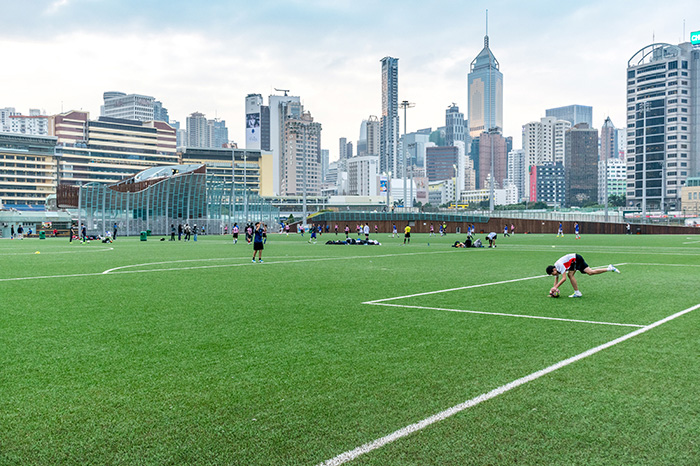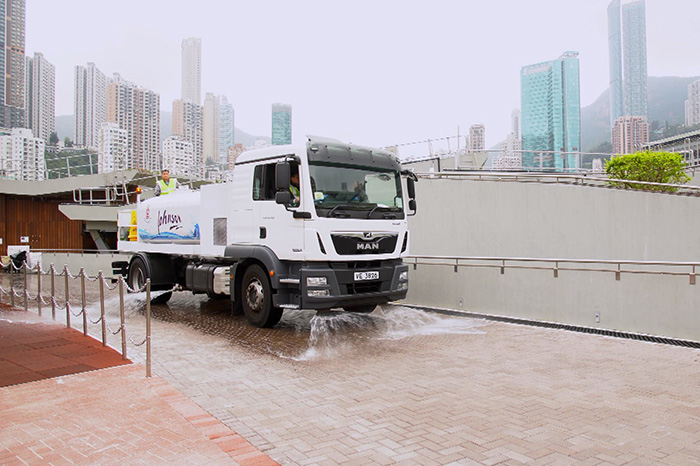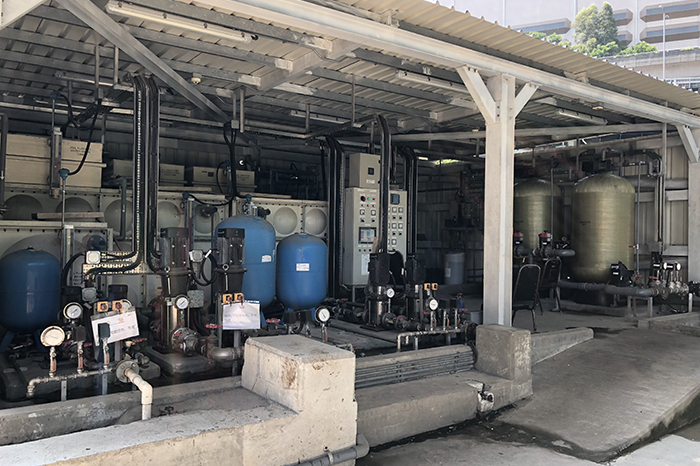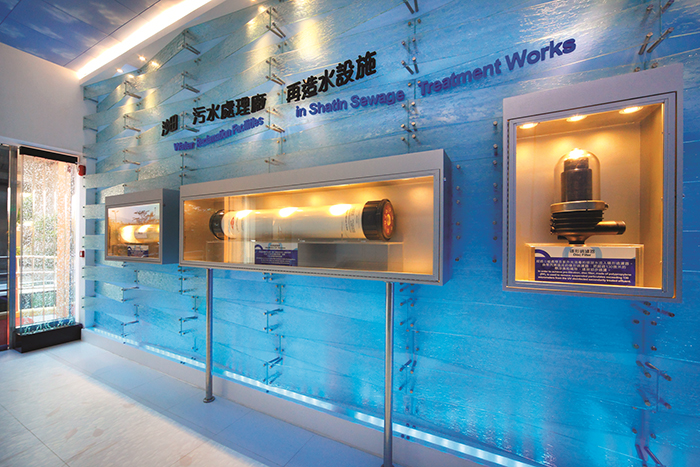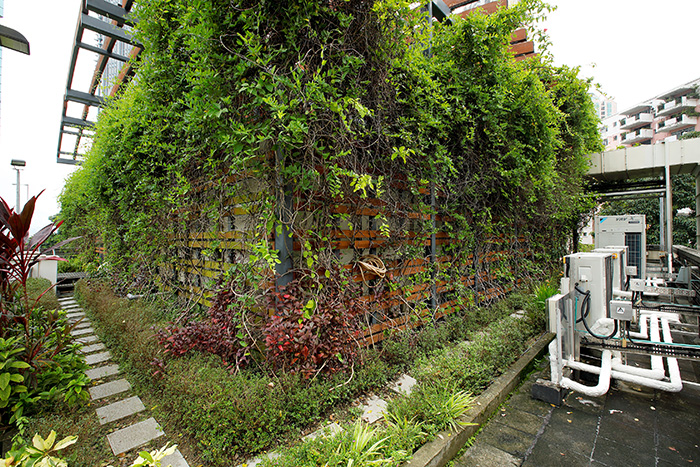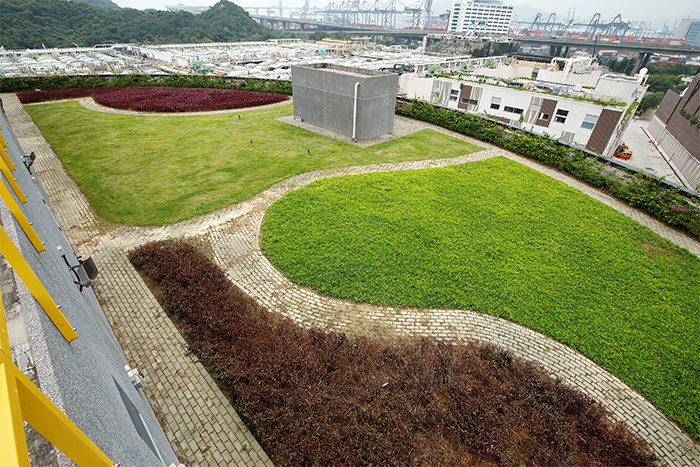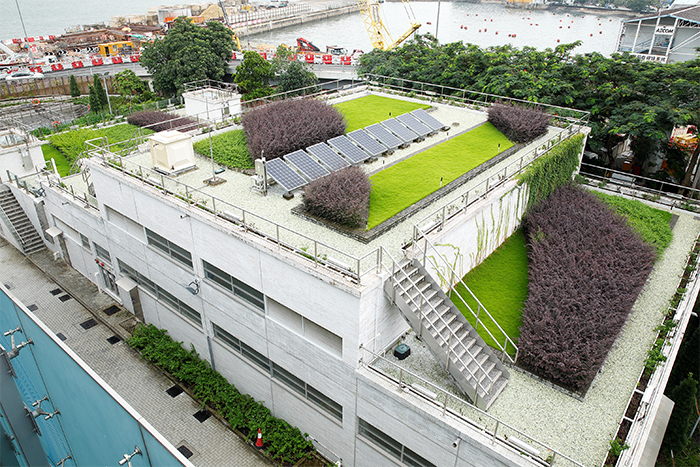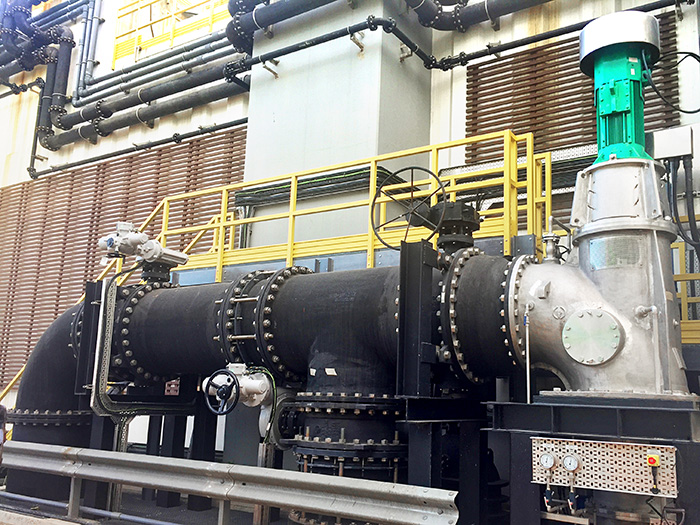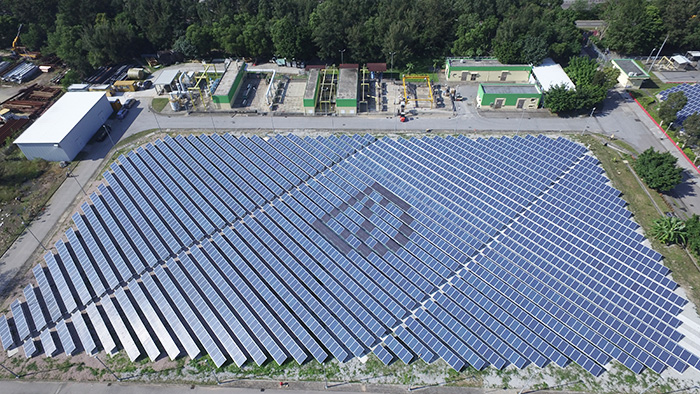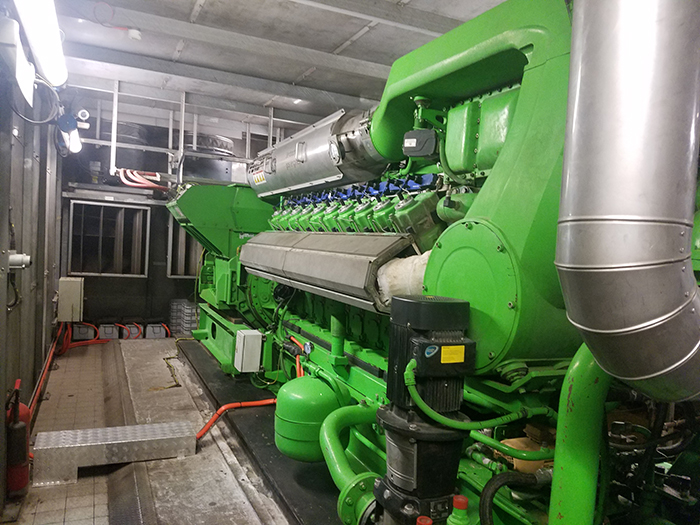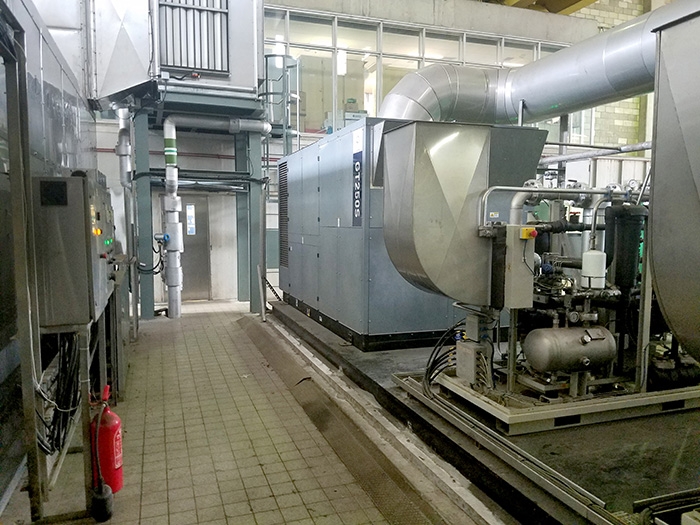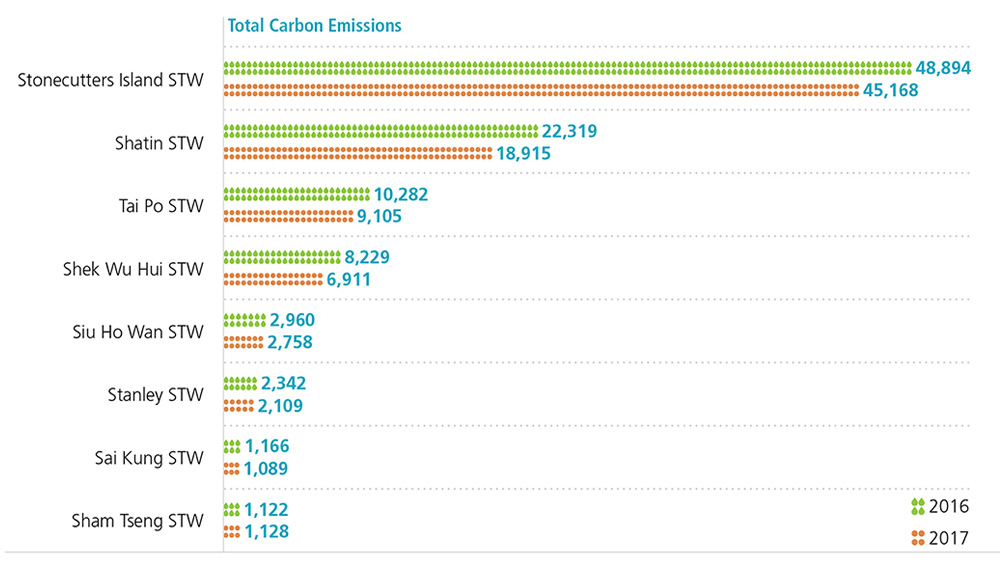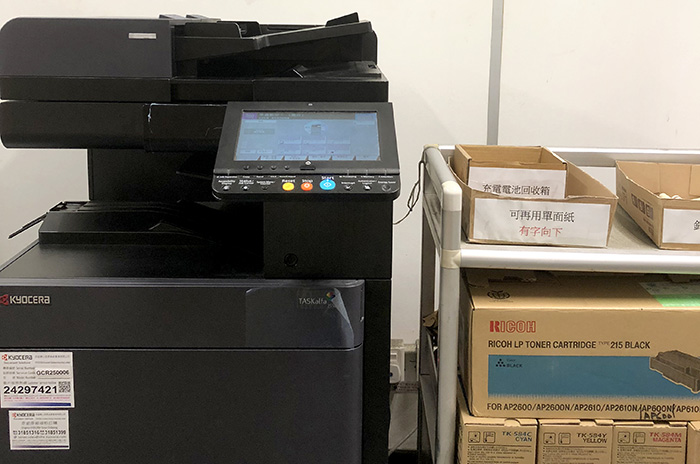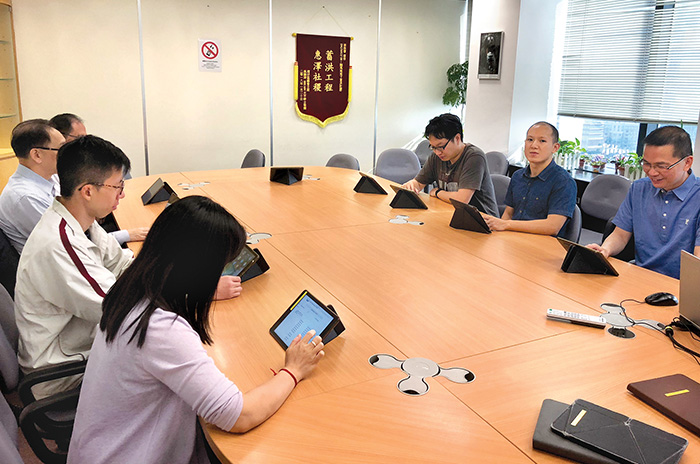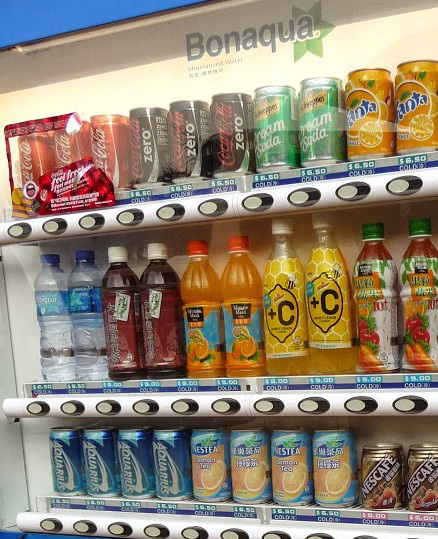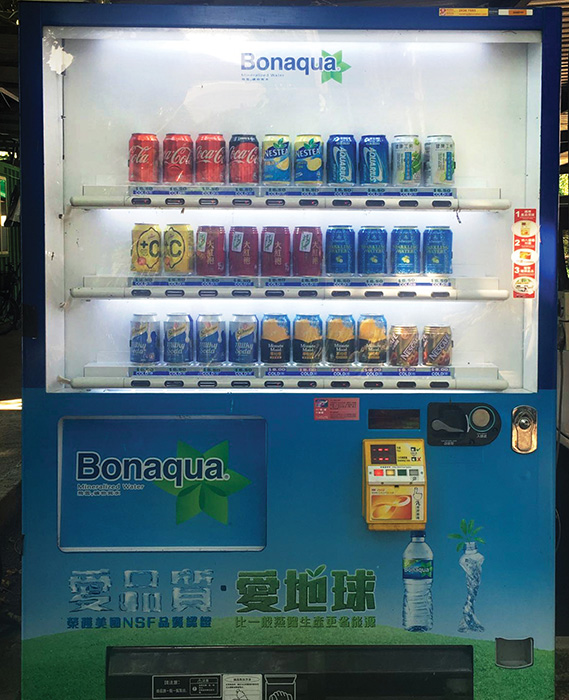Environmental Management
Throughout the years, DSD has been introducing cutting-edge engineering technologies and strategic measures in environmental management. We incorporate sustainability elements into all aspects of work and actively promote the concept of sustainable development, covering water resources management, roof greening, energy conservation and emissions reduction, to make the projects blends with the natural environment and mitigate environmental impacts.
Water Resources Management
Water Harvesting System
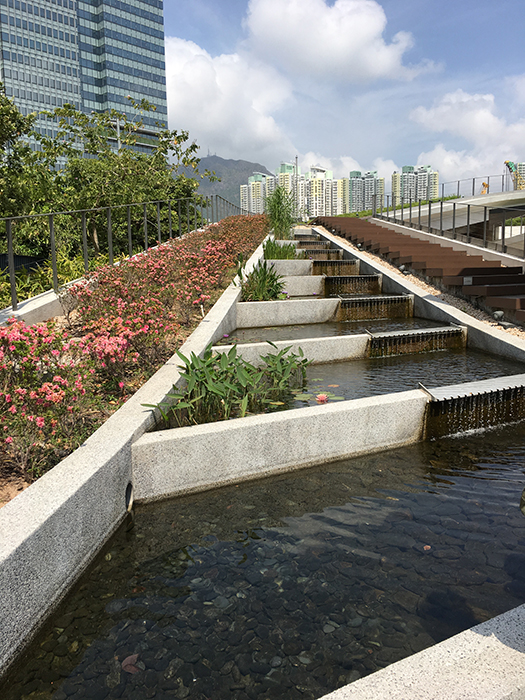
Kowloon City No. 1 and No. 2 Sewage Pumping Stations in Kai Tak incorporated a number of water resources management features, including rain garden and rainwater harvesting facilities
Water Reclamation
In 2017-18, we generated reclaimed water at an average rate of approximately 1,340 cubic metres per day for non-potable purposes. Our largest water reclamation facilities are located in the Ngong Ping Sewage Treatment Works and Shatin Sewage Treatment Works.
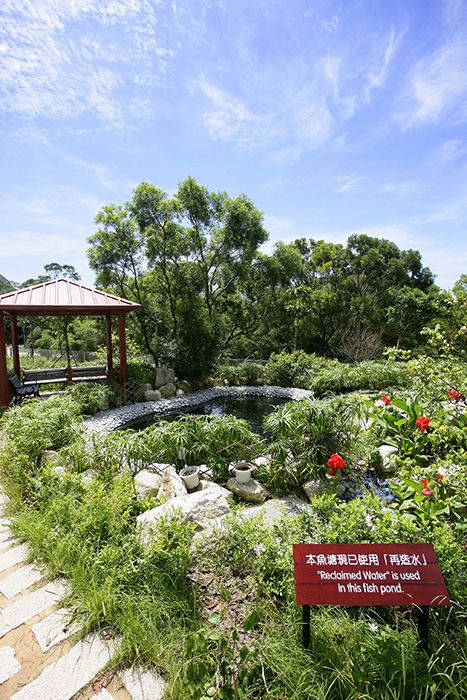
Some of the reclaimed water produced by Ngong Ping Sewage Treatment Works is used for rearing ornamental fish in fish ponds
Roof Greening
In 2017-18, we carried out roof greening for the following 9 DSD facilities, including:
Climate Change Mitigation and Adaptation
Since 2007, DSD has joined the Inter-departmental Working Group on Climate Change set up by the Environment Bureau for formulating polices and measures in adapting climate change to reduce greenhouse gas emissions and combat climate change. Besides actively implemented energy-saving initiatives and adopted hydropower, solar power and biogas to generate energy, DSD also joins the Connecting Delta Cities, a subsidiary of the international organisation C40 Cities Climate Leadership Group, and represents the HKSAR Government to exchange flood prevention techniques with other delta cities. DSD is also a member of the Hong Kong/Guangdong Joint Liaison Group on Combating Climate Change.
Newly Implemented Measures for Saving Energy and Harnessing Renewable Energy
Energy saving measures in place include:
- Replacing conventional fluorescent lamps with light emitting diode (LED) lamps;
- Optimising operation procedures and replacing equipment with more energy efficient ones at sewage treatment works and sewage pumping stations; and
- Installing photovoltaic solar panels.
During the year, the above measures saved a total of about 2.1 million kilowatt-hours of electricity (equivalent to carbon reduction of about 1,470 tonnes4).
| 4 | Using Hong Kong-wide default values of 0.7kg CO2 equivalent per kilowatt-hours. |
|---|
Electric Vehicle
Powered by batteries, the operation of electric vehicles (EV) does not involve gasoline combustion or produce emissions, which helps improve street-level air quality in Hong Kong. As at end March 2018, there were 31 EVs in our fleet. In 2017-18, there were totally 46 medium EV chargers installed in our sewage treatment works and sewage pumping stations to make charging more convenient and readily available.
Hydro-turbine System at Stonecutters Island Sewage Treatment Works (SCISTW)
We have installed a hydro-turbine system, which utilises sewage flow hydraulic energy to move the turbine impellers which in turn generate electricity for in-house use at SCISTW. The hydro-turbine system has a design capacity of 23 kilowatt and is expected to generate up to 120,000 kilowatt-hours of electricity per year. This system not only saves electricity costs, but also makes good use of hydropower to reduce carbon emissions. We are planning to install the second hydro-turbine system at SCISTW.
Installation of Photovoltaic Solar Panels in Sewage Treatment Facilities
As at end March 2018, DSD has installed photovoltaic (PV) panels in 11 sewage treatment works (STW) and 12 sewage pumping stations (SPS) to harness solar energy by maximising the use of the space of the plants. These major facilities include Shatin STW, Yuen Long STW, Shek Wu Hui STW and Stonecutters Island STW, etc. In particular, the Solar Farm at Siu Ho Wan STW has a generation capacity of 1,100 kilowatts, making it the largest PV system in Hong Kong at present. In 2017-18, the total generation capacity of our PV systems is about 1,390 kilowatts. We will continue to extend the use of renewable energy.
Converting Biogas to Energy
As of 2017-18, a total of five CHP generators, with a combined capacity of 3.6 megawatt, have been installed at Shatin STW, Tai Po STW and Shek Wu Hui STW, while two gas-turbines with a total capacity of 280 kilowatts have also been in place in Shatin STW and Yuen Long STW. During the year, the total energy generated by biogas in our STWs was equivalent to about 27 million kilowatt-hours.
To maximise the use of biogas generated during the sludge treatment process, we plan to install additional CHP generation and gas-turbine systems at our sewage treatment facilities such as Shatin STW, Tai Po STW and Yuen Long STW. On completion of these installations, the total power generation capacity will reach 5.4 megawatt.
Carbon Audit
Green Office
We make every effort to practise the green office concept in every aspect of our day-to-day operation. A series of green policies and measures are in place to raise the environmental awareness of our staff.

- DSD held about 210 paperless meetings and circulated more than 1,700 relevant documents electronically.
- Total paper consumption was 9,231 reams, down about 34% compared with 2009-10.

Supporting the Government's Call to Reduce Plastic Waste
Energy Saving
As reinforced in "Action Plan", the Government would step up the promotion of green buildings and reduce electricity consumption of government buildings. As a matter of fact, over the years, DSD has implemented a number of energy saving measures in our offices, including setting the room temperature at 25.5oC, reducing non-essential lighting, and using timers to turn off office equipment after office hours. Our electricity consumption has dropped significantly as a result. In 2017-18, we recorded approximately 18.7% reduction in energy consumption compared with 2010-11, showing our efforts in protecting the environment.
Green Procurement
Always in strong support of the Government's green procurement policy, DSD gives due consideration to environmental factors when procuring goods and services. In 2017-18, we purchased a wide variety of products complying with green specifications, including electrical appliances such as photocopiers, printers, electric fans, computers and refrigerators, and to office consumables such as recycled paper, correction tapes, pencils, rechargeable batteries, toilet paper and garbage bags.
A wide range of green materials and products have also been introduced to our projects, including:
- Paving blocks made from recycled glass;
- Recycled timber;
- Photovoltaic panels and photovoltaic LED lighting; and
- EVs and hybrid cars.


